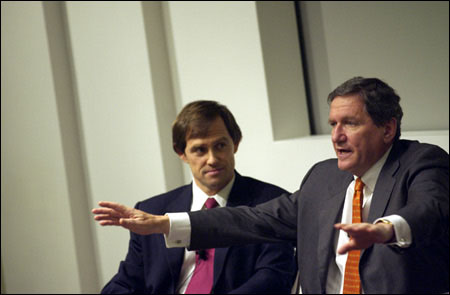Richard Holbrooke is ‘Great Negotiator’
Former U.S. ambassador to the United Nations accepts award, talks to students and faculty about dispute resolution

Richard Holbrooke, the premier architect of the 1995 peace agreement that ended the war in Bosnia and a skillful negotiator credited with resolving the bitter dispute over dues owed in arrears by the United States to the United Nations, has won the 2004 Great Negotiator Award. The former U.S. Ambassador to the United Nations received the award, presented by the Program on Negotiation (PON) at Harvard Law School, at a recent dinner held in his honor.
Created five years ago by PON, the annual award recognizes an individual whose achievements in the field of negotiation and dispute resolution have had a significant and enduring impact.
Holbrooke spent the afternoon before the award ceremony at the Business School, where, in a panel format, he answered questions from students, faculty, and the public about his negotiation strategies in the Bosnia and UN cases. Panel participants were associates of PON, which is an inter-University consortium of mediation and negotiation experts. The participants included Hannah Bowles, assistant professor of public policy at the Kennedy School; Antonia Chayes, visiting professor of international politics and law at The Fletcher School at Tufts University; James Sebenius, Gordon Donaldson Professor of Business Administration at Harvard Business School; and Michael Watkins, founder of Genesis Advisers and former Business School faculty member. Also participating was Robert Orr, formerly executive director of the Belfer Center at the Kennedy School and currently working in the executive office of the secretary-general of the United Nations.
Holbrooke described the situation in the Balkans as he first encountered it as the “greatest collective failure of the West since the 1930s.”
Why then, asked Watkins, had he decided to take it on?
“I offered to negotiate Bosnia, because it was the toughest challenge in the world.”
Sebenius asked about the decision to make bombing a key component of the negotiations. “There are times in some negotiations,” answered Holbrooke, “when the use of force or a credible threat of the use of force is an unavoidable option.”
“You made a difficult and tricky choice to disenfranchise the Bosnian Serbs; how did you make this decision?” asked Chayes. Holbrooke credited a top negotiator on his team, Robert Frasure, with the idea and went on to say: “I endorsed the decision … more out of instinct than analysis.”
Holbrooke explained why the negotiations were held in Dayton, Ohio: “I wanted the negotiations to take place in the U.S. because Geneva reeked of failure, and we could keep leaks to an absolute minimum. … If you control the venue, you have a tremendous advantage.”
The discussion took a turn from substance to style. “Negotiations are like jazz; they’re improvisations on a theme,” Holbrooke remarked. “You have to know where you’re going, and you may have to settle for less than 100 percent.”
Regarding the heated debate with members of Congress and UN member countries over the payment of U.S. arrears to the UN, Holbrooke described having to negotiate with the smallest of countries, like St. Kitts and Anguilla, to the largest, including China, to strike a deal. He also met with nearly every member of Congress, particularly those vehemently opposed to paying UN dues. “There is a reality to meeting people – you de-mythologize them,” he commented.
At the award ceremony, President Lawrence H. Summers, a colleague of Holbrooke’s in the Clinton Cabinet, introduced the honoree by noting, “It is a better world because of what this man has done as a negotiator.”
Presenting the honor to Holbrooke, HLS professor and PON Chair Robert Mnookin called the recipient a “peacemaker extraordinaire” who saved thousands of lives in Bosnia.
Last year, the Great Negotiator Award was given to Stuart Eizenstat, the former U.S. ambassador to the European Union. Other past recipients are Lakhdar Brahimi, the UN’s special envoy for Afghanistan (2002), Charlene Barshefsky, U.S. trade representative during the Clinton administration (2001), and former U.S. Senator George Mitchell (2000).




